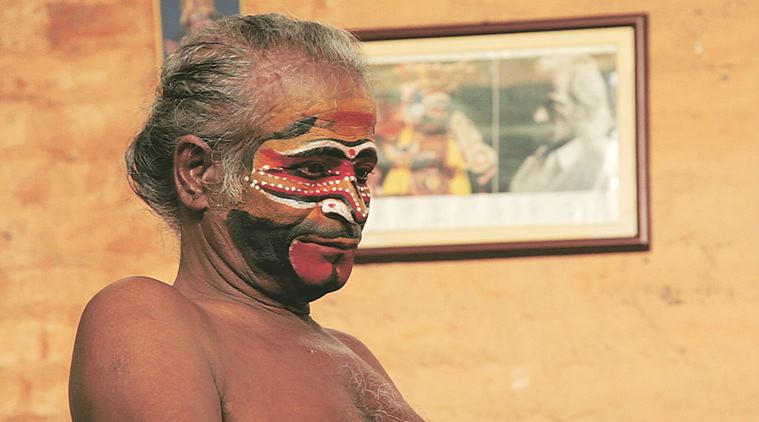Epic Journeys
Gods from mythology and heroes from the margins populate the koothu stage — and Sandhya Kumar’s film on this theatre form from Tamil Nadu

A still from Koothu; (below) Sandhya Kumar
In the dark of the night, old feuds play out on the koothu stage. In one scene, the Pandavas lose in a game of dice. In another, Abhimanyu is locked in a battle with Karna. Filmmaker Sandhya Kumar watched her first koothu performance in Bengaluru, far from the villages of Tamil Nadu, where it is a popular theatre form. “The performances and physical rigour that was needed in koothu were captivating to watch. I was completely blown away. The performance was entirely in Tamil but I realised that the language was not important to understand all the stories. That is what made me decide to make the film, Koothu,” says Kumar.
Koothu will be screened at Open Frame, an annual festival of films by the Public Service Broadcasting Trust (PSBT), at the India International Centre in Delhi on September 17. Koothu is performed during the nights of Mahabharata festivals, which are organised by temples where Draupadi is worshipped as a goddess. Early on, Kumar informs the viewers that performers are from marginalised communities, whose traditional duty it is to be “servants of society” and “appease the goddess”. She opens the film in darkness, with shots of a car travelling towards an area lit by fairy lights, and performers painting their faces into the masks of mythological figures.
The dark and light in Kumar’s film symbolises the night-long duration of koothu performances as well as the sociopolitical realities of the performers. Kumar, a political science graduate from Lady Shri Ram College in Delhi, who studied filmmaking at Jamia Milia and San Francisco Art Institute, draws out the subaltern nature of koothu in the film. “My mother is ashamed that I am a poor koothu performer. She doesn’t want others to know I do this,” says one boy. A young girl, with golden earrings and strands of white flowers in her hair, tells the camera that she performs despite opposition from her family. “Most of the time when I act like her, I imagine myself to be Draupadi. I like her strength. She was alone. She fought alone. Everybody says she was a very strong girl. I, too, wish to be like her,” she adds.
Koothu follows films by Kumar such as O Friend, This Waiting! — which was about Bharatanatyam as much as about sexuality and won a National Award in 2013 — and Hockey In My Blood, which is about the Kodava community, numbering 3,50,000 people, of Coorg that is passionate about sports. “I am definitely interested in the subaltern. With Koothu, I was also looking at Hanne M de Bruin, who is working so diligently and meticulously. She was struggling to give it legitimacy and raise funds for an art form that is primarily performed by lower castes. We show how we definitely have a caste bias,” says Kumar.
The film visits teachers, such as P Rajagopal and his Dutch wife, scholar Hanne M de Bruin, from the Kataikuttu Gurukulam, and Sambandan Thambiran, a fifth generation artiste, as well as traces developments in the form. Towards the end of Koothu, one actor, who plays the clown, says, “Why do people come for koothu? Do they come for the story, for the entertainment or perhaps because it gives them happiness.”
Open Frame is on till September 18






















No hay comentarios:
Publicar un comentario